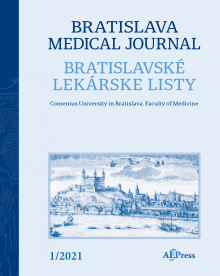Journal info
|
||||
Select Journal
Journals
Bratislava Medical Journal 2024 Ahead of print 2023 2022 2021 2020 2019 2018 2017 2016 2015 2014 2013 2012 Endocrine Regulations General Physiology and Biophysics Neoplasma Acta Virologica Studia Psychologica Cardiology Letters Psychológia a patopsych. dieťaťa Kovove Materialy-Metallic Materials Slovenská hudbaWebshop Cart
Your Cart is currently empty.
Info: Your browser does not accept cookies. To put products into your cart and purchase them you need to enable cookies.
BLL_2024_83 |
||
| Title: Evaluation of interferon gamma release assay to measure t-cell response in COVID-19 patients from intensive care units and inpatient departments | ||
| Author: Zainab KHAIRULLAH SEDEEQ, Ruqiyya SAMADZADE, Hatice TURK DAGI, Jale BENGI CELIK, Onur URAL, Duygu FINDIK | ||
| Abstract: BACKGROUND: Interferon gamma release assay (IGRA) is an in vitro blood test to measure interferon gamma (IFN-γ) released from antigen-specific T cells after stimulation with pathogen-specific peptides. In this study, it was aimed to investigate the T-cell response using IGRA and to compare various laboratory values in Coronavirus Disease (COVID-19) patients hospitalized either in hospital inpatient departments or in intensive care units. METHODS: A total of 100 patients (50+50) who were identified as positive for COVID-19 through the molecular method in Selcuk University Faculty of Medicine Infectious Diseases Service and Reanimation Intensive Care Unit were included in the study. IFN-γ levels in blood samples collected from patients were determined using the QuantiFERON Severe Acute Respiratory Syndrome Coronavirus (SARS-CoV-2) (QIAGEN, Germany) kit. The patients’ gender, age, c-reactive protein (CRP), aspartate aminotransferase (AST), alanine transaminase (ALT), interleukin (IL)-6, lymphocyte count, procalcitonin, and D-dimer results were obtained from the hospital automation system. RESULTS: Thirty-eight of the IGRA test results were negative, 44 were positive and 18 were inconclusive. The age of patients with negative IGRA test results was significantly higher (p<0.001) compared to patients with positive results. There were no significant differences between patients’ IGRA test results and gender, prognosis, IL-6, lymphocyte counts, CRP, AST, and ALT values. Age, death rates, D-dimer, CRP, procalcitonin, AST and ALT values of patients hospitalized in the intensive care unit were significantly higher (p<0.001) compared to the those hospitalized in the inpatient department, while conversely, the lymphocyte values were lower (p<0.001). CONCLUSION: The relatively higher IGRA negative results in the elderly, negative and intermediate results in intensive-care patients, and low lymphocyte levels in intensive-care patients indicate that the cellular immune response is diminished and/or absent. The death rates, D-dimer, CRP, procalcitonin, AST and ALT values of the patients hospitalized in the intensive care unit were higher compared to those from the in-patient department, indicating the severity of inflammation and signaling the development of organ failure. In the light of these findings, we suggest that IGRA tests may serve as a guide in immunomodulatory therapy (Tab. 2, Fig. 2, Ref. 27). Text in PDF www.elis.sk |
||
| Keywords: COVID-19, interferon gamma release assay test, T cell response | ||
| Published online: 29-Jun-2024 | ||
| Year: , Volume: , Issue: | Page From: , Page To: | |
| doi:10.4149/BLL_2024_83 |
||
|
|
 download file download file |
|

